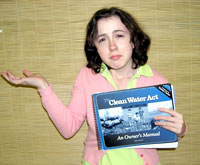 |
|
-March 2006- |
|
Navigating the waters of the Clean Water Act
Have you noticed large fish kills in your local stream and wondered what could be done to protect your fish population? Maybe you've wondered if the runoff going into your creek is being monitored by authorities. Or perhaps you've looked at regulations aimed to protect your water resources but found deciphering the legalese and scientific terminology as difficult as reading a foreign l anguage.
anguage.
If you have found yourself in a similar situation, you are not alone. In a recent study conducted by River Network, more than one third of Americans interested in river conservation "do not know what to do." They recognize the relationship between regulations and protecting water quality but do not know how to support and enforce the laws meant to protect our water resources.
To bridge this gap, environmental organizations in Illinois offer training sessions to Illinois citizens on how to use the Clean Water Act to protect their streams. One is sponsored by Prairie Rivers Network, Sierra Club, and the Environmental Law and Policy Center. "Clean Water Now!” explains how citizens can respond to public notices for wastewater discharge permits and construction and stormwater runoff and generally provides an overview of the Clean Water Act, its implementation, and enforcement. Practical steps for the beginner river advocate on how to use the Clean Water Act to protect local waterways will be provided.
Understanding water regulation, protection, and conservation is key to playing a role in the protection of your watershed. The next Clean Water Now! training will be offered on March 18, in Mokena, Illinois. If you would like to participate or would like to inquire about the possibility of a Clean Water Act training in your area, please contact Prairie Rivers Network for more details at 217-344-2371.